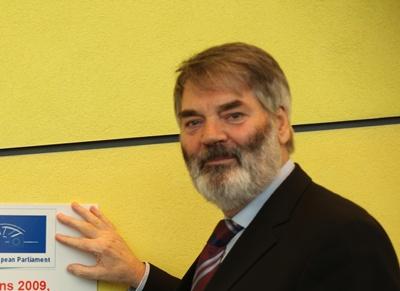Israel refuses EU delegation entry to Gaza

An audience in Dublin heard yesterday that a Committee of the European Union will be refused access to Palestine by Israel in a forthcoming trip, and that media reportage does not reflect the "reality on the ground" for Palestinians. By Shane Creevy.
Proinsias de Rossa, Chair of the European Parliament's Delegation for Relations with the Palestinian Legislative Council (DPLC), explained that a European Parliament Committee are to meet Israeli and Palestinian sides in the last week of May.
However, de Rossa said that the Committee had received a letter from Israeli diplomats this week, stating that the Committee may not meet Palestinian officials or visit Palestine while in the Middle East.
This was met with “huge anger in the parliament from left to right”, said de Rossa. “Amongst those who are strong Israeli friends aswell as those who are strong Palestinian friends – all of them reject the right of Israel to dictate to the European Parliament who we may or may not meet." He said efforts were being made to resolve the issue.
De Rossa said that he opposed Israel’s accession to the OECD, reliant on a formal decision to be taken on May 27.
In the aftermath of his visit to Gaza, Minister for Foreign Affairs Micheal Martin described the conditions there as “inhumane and utterly unacceptable in terms of accepted international standards of human rights”. De Rossa was mystified that despite Martin’s words, there was no opposition from the Irish government in relation to Israel’s accession to the OECD.
Audio: Politico interviews Nasim Ahmed of the Palestinian Return Centre and Proinsias de Rossa, Labour MEP
{saudioplayer}Rossa_Ahmed.mp3{/saudioplayer}
The guest speaker at the event, Nasim Ahmed of the Palestinian Return Centre London, said that mainstream media facilitated the propagation of official political discourse which diverts from the reality on the ground.
This was most obvious, he said, by the suggestion from some quarters that Palestine should embrace its position and become the "Dubai of the West Bank". Such language functioned only as a reiteration of a neo-liberal conversation to which ordinary Palestinians were not invited. This assumes, he said, that “political problems... can be dissolved through economic projects”.
He said that Israel not only refused to withdraw from lands, as is called for by the United Nations Security Council Resolution 242, but that it was refusing to cease building on Palestinian land. Ahmed said: "Even though Israel is built on 71% of land from Palestine it cannot even make simple concessions like halting settlements, which it is obliged to under international law."
Ahmed focused much of his speech on the Goldstone Report. This report, released September 15 2009, was an independent analysis of human rights violations in Palestine. Ahmed said that the Goldstone Report criticises both Israelis and Palestinians but that the overwhelming slant of the criticism is pointed at the Israelis. He argued that this was not reflected in media representation. This was an attempt, he said, to “equalise the blame”.
Proximity talks are continuing between both sides, with the United States taking a particular interest in peace in the region.
